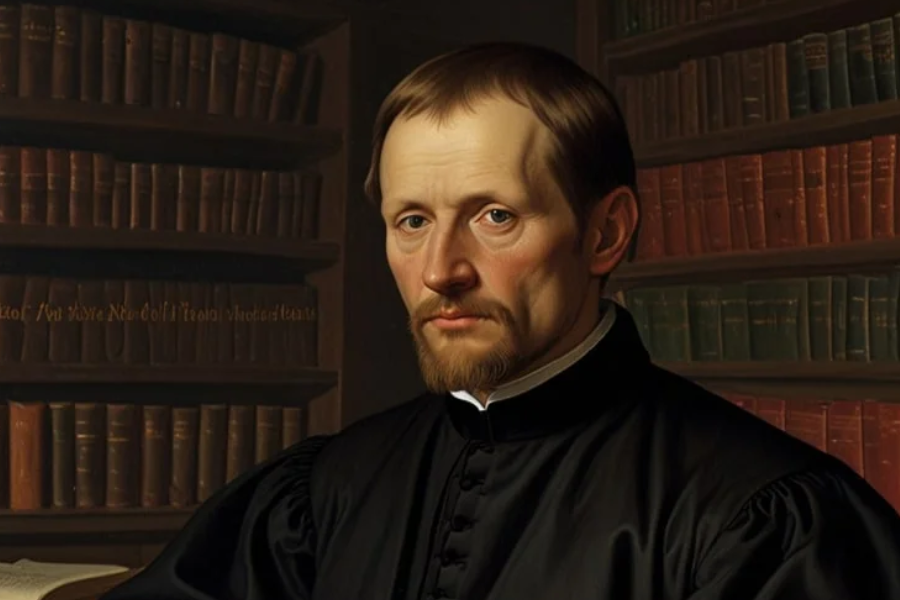Heinrich Servais Germany: A Skilled Diplomat Advocating For Lasting Peace In A Divided Europe

Heinrich Servais was a notable figure in 16th-century Germany, a period characterized by profound transformations across Europe. This era was marked by religious strife, political upheaval, and economic challenges, which significantly influenced the social landscape. Servais emerged as a key player in his community, navigating these complexities and contributing to the evolving dynamics of his time. His efforts resonated throughout his region, showcasing the vital role individuals can play in shaping their societies.
Despite the tumultuous environment, Servais’s dedication to his community and country laid the groundwork for lasting change. His legacy is a testament to the potential for personal influence amidst broader historical forces. By actively engaging with the issues of his day, Servais not only addressed immediate concerns but also helped to forge a path toward a more stable and prosperous future for his region, exemplifying how one person’s actions can reverberate through history.
Heinrich Servais: An Influential Presence In 16th Century Germany

Heinrich Servais emerged as a significant figure in mid-16th century Germany, recognized for his contributions to local governance and community affairs. Born into an affluent family, he enjoyed educational opportunities and established connections that elevated his status within society. While specific details about his personal life remain scarce, the existence of his portrait indicates that he was regarded as an influential individual, underscoring his importance in the social hierarchy of his time.
Servais lived during a transformative period in European history, characterized by religious reforms, political turmoil, and flourishing artistic expression. The mid-1500s were emblematic of the Renaissance in Germany, where art served not only as a means of aesthetic appreciation but also as a reflection of personal status and wealth. This cultural backdrop provided a rich environment for individuals like Servais to assert their influence and legacy, highlighting the interconnectedness of art, politics, and societal standing during this dynamic era.
Early Life And Career Of Heinrich Servais
Heinrich Servais was born in Germany to a humble family that prioritized education and diligence. From a young age, he exhibited a strong curiosity and a drive to succeed. His early years were characterized by a deep interest in economics and trade, which would later play a pivotal role in his professional life. Growing up in an environment that valued learning, Servais was well-equipped to navigate the complexities of the business world.
After completing his education, Servais began his career as an apprentice at a local trading company. It was here that he honed his understanding of business operations and developed a strong work ethic. His commitment and talent quickly attracted the attention of industry leaders, leading to opportunities for advancement. As he transitioned into various roles within larger corporations, he further refined his skills and expanded his professional network. These experiences provided the essential foundation for his future contributions to both national and international markets, marking the beginning of a notable career in trade and economics.
The Servais Family Background
The Servais family name carries considerable historical significance in Germany, especially during the mid-16th century. Heinrich Servais, born around 1555, emerged as a notable figure within this lineage, and his descendants have since dispersed across various regions. Exploring the context of the Servais family is essential for anyone interested in genealogical studies, as it lays the groundwork for understanding their heritage and impact on society.
The roots of the Servais family can be traced back to areas renowned for their cultural and economic contributions to Germany. They were likely engaged in a variety of trades and professions, which played a vital role in supporting the local economy and enriching the community’s social structure. This background not only sheds light on the daily lives of Heinrich and his relatives but also highlights the challenges and accomplishments they faced throughout their history.
To trace the lineage of the Servais family effectively, one must examine a range of historical documents, including church records, land ownership papers, and civic registries. These valuable resources offer insights into how the family navigated the complexities of 16th-century German society, revealing their social standing, economic activities, and interactions with the broader community. Through this research, we gain a deeper understanding of the Servais family’s legacy and their enduring influence on the region.
The Contributions Of Heinrich Servais To Local Governance

Heinrich Servais played a pivotal role in local governance during his time in mid-16th century Germany, particularly following the Peace of Augsburg in 1555. This treaty aimed to resolve religious conflicts between Catholics and Protestants, and Servais was instrumental in implementing its terms within his region. His authority and influence allowed him to help maintain order and promote stability during a tumultuous period in European history.
Renowned for his just and impartial approach to leadership, Servais garnered the esteem and admiration of both his colleagues and the community. His commitment to justice and equality fostered a sense of trust in his administration, allowing him to effectively address the concerns of diverse community members. Furthermore, Servais’s ability to navigate the intricate political dynamics of the era demonstrated his exceptional leadership skills, as he worked tirelessly to balance competing interests while ensuring the well-being of his constituents.
Through his involvement in local governance, Heinrich Servais not only contributed to the implementation of the Peace of Augsburg but also helped to shape the political landscape of his region. His legacy as a respected leader remains a testament to his dedication to fostering harmony and stability in a time marked by conflict and change.
Religious Influence And Heinrich Servais
Heinrich Servais lived during a period of significant religious transformation in Germany, largely driven by the Protestant Reformation. This movement challenged the longstanding dominance of the Catholic Church and gave rise to various Protestant sects. Servais, being sympathetic to the Lutheran cause, actively supported the dissemination of Protestant ideals in his community. His alignment with these emerging beliefs not only reflected the changing spiritual landscape of the time but also highlighted his commitment to the evolving needs of his constituents.
Despite his support for Protestantism, Heinrich Servais understood the importance of religious tolerance. He recognized that the fervor of the Reformation could easily escalate into conflict if not carefully managed. Consequently, he made it a priority to promote dialogue and coexistence between Catholics and Protestants within his region. His diplomatic efforts were crucial in fostering an environment of mutual respect and understanding, which was essential for maintaining peace during such a turbulent period in history.
Servais’s approach to religious diversity exemplified his pragmatic leadership style and deep commitment to social harmony. By balancing his personal beliefs with a dedication to preventing sectarian violence, he played a vital role in ensuring stability and fostering a sense of community amid the religious upheaval that characterized 16th-century Germany.
Helping To Keep The Peace

The Peace of Augsburg, established in 1555, represented a crucial milestone in an era marked by intense religious conflict. This agreement allowed various Christian denominations, particularly Catholics and Lutherans, to coexist more peacefully. Heinrich Servais was instrumental in this historical event, serving as a talented diplomat and mediator. His efforts were instrumental in bringing together leaders from diverse religious backgrounds and facilitating discussions that would lead to the formation of the treaty.
Servais’s diplomatic acumen was critical in mediating between opposing factions, as he worked to identify common interests and foster dialogue. His commitment to finding a middle ground not only contributed to the success of the Peace of Augsburg but also laid the groundwork for a more stable society. By promoting understanding and cooperation among rival groups, Servais helped to create an environment conducive to rebuilding communities that had suffered from years of conflict.
The impact of the Peace of Augsburg extended beyond a mere cessation of hostilities; it established a framework for future collaboration between different faiths. Heinrich Servais’s contributions to this process ensured that the peace achieved was not merely a temporary solution but a lasting foundation for coexistence. His legacy highlights the importance of diplomacy and negotiation in addressing societal divisions and fostering a spirit of unity in a diverse community.
A Fair And Just Leader
Heinrich Servais emerged as a respected leader during a tumultuous period in German history, renowned for his unwavering commitment to fairness and justice. Unlike many of his contemporaries who wielded power to impose their will, Servais distinguished himself by advocating for equal treatment of all individuals, regardless of their social standing or wealth. His philosophy was rooted in the belief that the rule of law should apply universally, providing a framework for accountability and integrity within governance.
Servais’s leadership was characterized by a strong sense of responsibility and genuine concern for the welfare of his community. He understood that a stable society was built on trust and mutual respect, and he worked diligently to foster these values. His approach to governance created an environment where citizens felt secure and empowered, encouraging them to engage actively in community life. Under his guidance, his region gained a reputation for stability and fairness, becoming an attractive destination for those seeking refuge from injustice and persecution.
Ultimately, Heinrich Servais’s legacy as a fair and just leader serves as a reminder of the profound impact that principled leadership can have on a community. His efforts not only helped to cultivate a culture of fairness but also contributed to a more harmonious society, laying the groundwork for future generations to thrive in a just and equitable environment.
Standing Up For Religious Freedom

During the era of Heinrich Servais, religious freedom was a deeply contentious issue, with tensions between Catholics and Protestants igniting conflicts that resulted in wars, persecution, and significant suffering for countless individuals. In this challenging landscape, Servais’s advocacy for religious tolerance emerged as both a courageous and essential stance. He firmly believed that every individual should have the right to choose their faith without facing punishment or discrimination, emphasizing the importance of personal freedom in spiritual matters.
Servais’s commitment to promoting religious freedom went beyond merely avoiding conflict; he aimed to foster a society where diverse beliefs could coexist harmoniously. His efforts to champion tolerance laid the groundwork for a more inclusive community, where individuals could live together peacefully despite their differing beliefs. By advocating for an open-minded approach to faith, Servais not only contributed to the healing of societal wounds but also provided a framework for future generations to embrace diversity and coexistence.
In an era marked by strife and division, Heinrich Servais’s dedication to religious freedom served as a beacon of hope. His courageous stance not only challenged the prevailing norms of intolerance but also helped cultivate an environment in which individuals could express their beliefs freely. This commitment to coexistence and understanding was vital in building a more united society, demonstrating the profound impact that one individual’s principles can have on the broader community.
Boosting The Economy
Heinrich Servais played a pivotal role in the economic revitalization of his region during a period marked by the aftermath of religious conflict. The local economy had been severely impacted, with markets disrupted and trade routes damaged. Understanding that a stable economy was essential for long-term peace and prosperity, Servais took proactive measures to address these challenges. He championed initiatives to reopen markets, repair essential infrastructure, and facilitate trade, recognizing that economic recovery was crucial for rebuilding the social fabric of the community.
By fostering economic growth, Servais not only helped create jobs but also improved the overall living standards of the people in his region. His efforts were aimed at more than just financial gain; they were focused on revitalizing communities and instilling hope among the populace. This economic resurgence provided a much-needed foundation for individuals and families to rebuild their lives and regain their sense of stability after the tumultuous years of conflict.
Ultimately, Heinrich Servais’s contributions to the economy were instrumental in helping his region recover from the devastation of war. His vision for a prosperous community laid the groundwork for future economic success, demonstrating the vital link between economic stability and social harmony. Through his actions, he exemplified the belief that a thriving economy is essential for fostering a sense of community and hope for the future.
Belief In Education

Heinrich Servais recognized the vital importance of education in shaping a strong and prosperous society. He was an advocate for the transformative power of education, believing that it could significantly enhance individual lives and strengthen communities. At a time when educational opportunities were scarce and literacy rates were low, Servais took it upon himself to champion the establishment of schools and universities in his region, striving to increase knowledge accessibility for everyone.
Servais firmly believed that education should be a universal right, available to individuals regardless of their social or economic background. By promoting educational initiatives, he aimed to cultivate a more informed and skilled population, which would ultimately contribute to the community’s overall stability and resilience. His forward-thinking approach emphasized the long-term advantages of investing in the intellectual development of individuals, fostering a culture of learning and critical thinking.
His commitment to education not only benefited his contemporaries but also laid the groundwork for future generations. By prioritizing educational access and quality, Heinrich Servais helped to create a legacy of knowledge and enlightenment that would empower individuals and elevate the collective potential of his society. This belief in education as a catalyst for progress reflects his understanding of its essential role in building a thriving community.
Keeping the Peace And Justice
In an era marked by violence and instability, Heinrich Servais emerged as a staunch advocate for peace and justice. Recognizing the crucial role of a robust legal system in maintaining order, he dedicated himself to enhancing the legal institutions in his region. Servais believed that fairness in law was essential for fostering a sense of security among the populace, and he worked tirelessly to ensure that laws were consistently enforced and accessible to everyone, regardless of their status.
His initiatives helped cultivate a stable environment where individuals could conduct their lives and businesses without the threat of arbitrary actions or injustices. Through his support for the rule of law and equitable treatment, Heinrich Servais established a groundwork for lasting stability and prosperity within his community. His leadership in promoting justice was instrumental not only in creating a sense of trust among the people but also in encouraging economic growth and social cohesion.
Through his unwavering commitment to peace and justice, Servais significantly influenced the development of his region, shaping it into a place where individuals felt secure and valued. His legacy as a fair leader underscores the importance of justice in governance and its vital role in building a harmonious society. The impact of his efforts continues to resonate, highlighting the enduring significance of equitable legal practices in community development.
Supporting The Arts
Heinrich Servais understood the profound impact that culture and the arts have on community identity and individual expression. As a patron of the arts, he actively championed local artists, musicians, and writers, recognizing that their work could inspire creativity and foster a sense of belonging among the people. During his tenure, he facilitated opportunities for artistic endeavors, which not only provided a platform for creative voices but also enriched the cultural fabric of his region.
By nurturing the arts, Servais helped cultivate a vibrant cultural environment where artistic expression could thrive. This initiative not only made his community a more dynamic and engaging place to live but also reflected his commitment to enhancing the overall quality of life for its residents. The arts became a unifying force, bringing people together and allowing them to celebrate their shared heritage and creativity.
His dedication to supporting the arts serves as a testament to the belief that culture plays a vital role in societal development. Through his efforts, Heinrich Servais left a lasting legacy that highlighted the importance of artistic expression in promoting community cohesion and personal fulfillment, ensuring that the arts would continue to be an integral part of life in his region.
The Lasting Impact Of Heinrich Servais

Heinrich Servais left a profound legacy that has withstood the test of time. His dedication to fostering peace, justice, education, and cultural development has significantly shaped his region, establishing foundational values that continue to influence contemporary society. By promoting religious tolerance and advocating for fairness, he laid the groundwork for a community that values diversity and inclusion. Servais’s life serves as a powerful reminder of how one individual’s actions can create lasting change and inspire future generations.
Moreover, his commitment to education has had a ripple effect that extends far beyond his own time. By supporting access to education for all, Servais empowered countless individuals to improve their lives and contribute meaningfully to society. This focus on educational advancement has resulted in a more informed and capable population, reinforcing the importance of knowledge in driving social progress. The institutions he helped establish remain vital today, reflecting the enduring significance of his vision.
In essence, Heinrich Servais’s impact is woven into the very fabric of his community. His unwavering dedication to justice and equality has established a legacy that continues to inspire those who seek to make a difference in the world. The principles he championed resonate in modern values and institutions, ensuring that his contributions will be remembered and celebrated for generations to come.
FAQs About Heinrich Servais
1. Who was Heinrich Servais?
Heinrich Servais was a notable leader in 16th-century Germany, recognized for his contributions to governance, peace, education, and the arts.
2. What impact did he have on his community?
Heinrich Servais fostered peace and justice, strengthened legal institutions, and supported educational initiatives, leaving a lasting legacy.
3. How did he promote religious tolerance?
Servais advocated for dialogue and coexistence between Catholics and Protestants during the Reformation, helping to maintain peace in a divided society.
4. What role did he play in the economy?
He championed economic revitalization by reopening markets and repairing infrastructure, improving living standards and job opportunities in his region.
5. Why is education significant in his legacy?
Servais emphasized the importance of accessible education, laying the groundwork for a more informed population and societal progress.
Conclusion
Heinrich Servais stands as a remarkable figure in 16th-century Germany, whose multifaceted contributions to peace, justice, education, and culture have left an enduring mark on his community. His leadership during a time of significant social and political upheaval exemplifies how one individual can profoundly influence the course of history. By promoting religious tolerance, advocating for fairness, and supporting the arts, Servais fostered a sense of unity and purpose among his contemporaries.
The principles he championed—justice, equality, and education—continue to resonate today, serving as a foundation for modern values and institutions. As we reflect on his legacy, we are reminded of the potential for individuals to effect meaningful change and inspire future generations to pursue a more just and equitable society. Heinrich Servais’s life and work remain a testament to the enduring impact of principled leadership in shaping communities and cultures for the better.
Stay in touch for more updates and alerts visit: Techpro Magazine!





